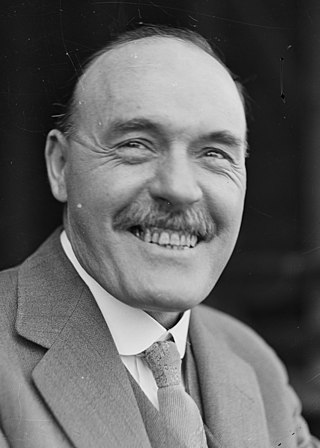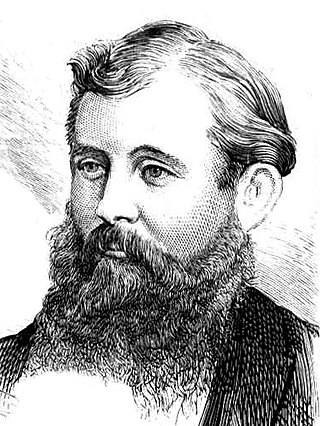Related Research Articles
Owen Gilbert was an Australian politician. He was a Liberal Reform Party member of the New South Wales Legislative Assembly from 1901 to 1910, representing the electorates of Newcastle West (1901-1904) and Newcastle (1904-1910).
Members of the New South Wales Legislative Assembly who served in the 44th parliament held their seats from 1973 to 1976. They were elected at the 1973 state election, and at by-elections. The Speaker was Jim Cameron.
Macquarie, until 1910 The Macquarie was an electoral district of the Legislative Assembly in the Australian state of New South Wales, created in 1894 and named after the Macquarie River. It was re-created in 1904, retaining nothing but the name, then abolished in 1920.
John Charles Lucas Fitzpatrick was an Australian politician and journalist.

John Estell was a politician and coal miner in New South Wales, Australia. He was a member of the New South Wales Parliament for 29 years, including 20 years in the Legislative Assembly. He was a minister in the Holman, Storey and Dooley Labor governments.
Members of the New South Wales Legislative Assembly who served in the 25th parliament of New South Wales held their seats from 1920 to 1922. They were elected at the 1920 state election on 20 March 1920. The Speaker was Daniel Levy with the exception of 13–20 December 1921 when he was replaced by Simon Hickey.

The 1925 New South Wales state election was held on 30 May 1925. This election was for all of the 90 seats in the 27th New South Wales Legislative Assembly and was conducted in multiple-member constituencies using the Hare Clark single transferable vote. This was the last election to use STV to elect the NSW Assembly.
Ronald Alfred St Clair Brewer was an Australian politician. He was the Country Party member for Goulburn in the New South Wales Legislative Assembly from 1965 to 1984.
John Ryan Brenan was an Australian politician and an elected member of the New South Wales Legislative Assembly for 68 days in 1856. He founded, and outlined, the suburb of Smithfield in Sydney. Furthermore, Brenan Park, which is in that suburb, was named after him.
Goulburn, an electoral district of the Legislative Assembly in the Australian state of New South Wales, has had two incarnations, from 1859 until 1991 and from 2007 to the present.

Richard Thomas Ball was a politician and engineer in New South Wales, Australia.

John Fitzgerald Burns was an Australian politician, member of the Parliament of New South Wales, Postmaster-General in the 1870s and Colonial Treasurer in the 1880s.

The Wran ministry (1976–1978) or First Wran ministry was the 71st ministry of the New South Wales Government, and was led by the 35th Premier of New South Wales, Neville Wran, representing the Labor Party. It was the first of eight consecutive occasions when Wran was Premier.

John Thomas Gannon was a politician and solicitor in New South Wales, Australia.
Sydney City, an electoral district of the Legislative Assembly in the Australian state of New South Wales, had two incarnations, from 1950 until 1971 and from 1988 until 1999.
The 1904 New South Wales state election involved 90 electoral districts returning one member each. The election was conducted on the basis of a simple majority or first-past-the-post voting system. There were two significant changes from the 1901 election, the first was that women were given the right to vote, which saw an increase in the number of enrolled voters from 345,500 in 1901, to 689,490 in 1904. The second was that as a result of the 1903 New South Wales referendum, the number of members of the Legislative Assembly was reduced from 125 to 90. The combined effect of the changes meant that the average number of enrolled voters per electorate went from 2,764, to 7,661, an increase of 277%. Leichhardt was the only district that was not substantially changed, while The Macquarie and The Murray districts retained nothing but the name.
A by-election was held for the New South Wales Legislative Assembly electorate of Goulburn on 13 June 1861 because of the resignation of Charles Walsh. Walsh stated that he had been elected to support the Land Bills, which would open up the free selection of Crown land, and the Legislative Council Bill which would replace the nominated council with an elected body. These bills had not been passed by the Legislative Council and the Premier Charles Cowper had arranged for 21 new members to be appointed to the council. Walsh stated that as the bills "will be carried through both branches of the legislature, and become the law of the land" he therefore resigned as the tasks had been achieved.
A by-election was held for the New South Wales Legislative Assembly electorate of Goulburn on 16 August 1890 because of the death of William Teece.
A by-election was held for the New South Wales Legislative Assembly electorate of Goulburn on 1 June 1946 because of the resignation of Jack Tully (Labor) to be appointed Agent-General for New South Wales in London.
Sturt, an electoral district of the Legislative Assembly in the Australian state of New South Wales, had two incarnations, from 1889 until 1968 and from 1971 until 1981.
References
- 1 2 "1974 legislative election: House of Representatives: New South Wales". Psephos- Adam Carr's election archive. Retrieved 18 October 2019.
- 1 2 Green, Antony. "1974 Goulburn by-election". New South Wales Election Results 1856-2007. Parliament of New South Wales . Retrieved 18 October 2019.
- ↑ "Proclamation to dissolve the Senate and House of Representatives". Australian Government Gazette . No. 31B. 11 April 1974. p. 1. Retrieved 18 October 2019– via Trove.
- ↑ "Mr Ronald Alfred St Clair Brewer (1921-2003)". Former members of the Parliament of New South Wales . Retrieved 11 May 2019.
- ↑ "Writ of election: Goulburn". New South Wales Government Gazette . No. 53. 13 May 1974. p. 1147. Retrieved 18 October 2019– via Trove.
- ↑ "In brief: Candidate". The Canberra Times . 11 June 1974. p. 3. Retrieved 18 October 2019– via Trove.
- ↑ Green, Antony. "Index to candidates: McCaughey to McKeever". New South Wales Election Results 1856-2007. Parliament of New South Wales . Retrieved 18 October 2019.